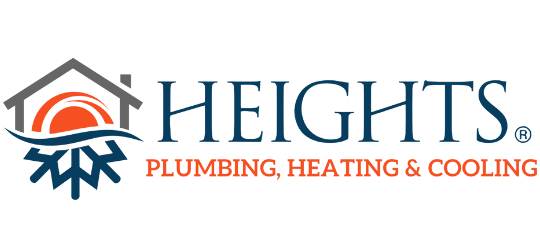Explore the Features
FAQ
This is probably the most commonly asked plumbing question. In most cases it is caused by the flapper not closing on or making a proper seal around the flush valve. If the flapper is not closing, then jiggle the handle and that will normally fix the issue. If the flapper is worn out and not properly sealing, then you will have to have the flapper replaced. Either way if the flapper does not seal the water will leak into the toilet and the tank will not fill with water to push the float up and turn off the supply of water. Call Heights Plumbing Heating & Cooling for any toilet issues.
Drain cleaners are very toxic. If you ever look on the back of the product you will notice at least 3 warning labels. These are not very good products to have laying around your house especially if you have kids or pets. These toxic chemicals are also very bad for your pipes, causing them to deteriorate from the inside out. If this happens your drain lines will need to be replaced. There are enzymes and friendly bacteria products that will keep grease and sludge from building up inside of your pipes.
If you have a clog please call the professionals at Heights Plumbing Heating & Cooling.
Depending on the age and type of your heater there are a couple of reason you may be running out so quickly.
Electric water heaters commonly have 2 elements that heat the water. The top element and the lower element. Chances are if you are running out of hot water quickly the lower element is not working and only the top portion of the tank is being heated. If the top element stops working, then neither will heat and you will have no hot water.
There is also a reset button on an electric water heater that can trip. If the reset button is tripped that is an indicator that there is a more serious problem.
If you have a gas hot water tank the most common reason is the dip tube. The dip tube is a piece of pipe that directs the cold water to the bottom of the tank to get heated. Over time this dip tube can get shorter causing the cold water to mix with the hot causing temped water.
Call Heights Plumbing Heating & Cooling if you have any questions about hot water tank issues.
The best way to prevent water damage is to be on the lookout for leaks and to receive regular maintenance of your plumbing system. As soon as you notice an issue, call an experienced plumber.
As soon as you notice the burst pipe, shut off the water at the main valve. Turn off electricity to avoid shock and call us as soon as possible. There’s no time to waste.
If your toilet starts overflowing, don’t panic. You can prevent the toilet from losing more water by shutting off the valve located behind the toilet. Then, clean up the water and call the plumber.
A drain snake could unblock a stubborn clog in your bathtub. But if that doesn’t work, the clog may be too far down the line for you to reach.
An unexpected increase in your water bill is a sign that you have a leak. Even if you don’t see the leak, you could have a hidden one.
Although some people are perfectly fine with a traditional hot water heater, there are several benefits to using a tankless hot water heater. They never run out of water and can save you money.
In an effort to save money, you may consider doing your own plumbing repairs. This is a mistake that could result in an injury or further damage to your plumbing.
There are several ways in which a plumber can remove a blockage in your pipes. One such way is with hydrojetting. They use a long hose and snake it down your pipes. Then, they shoot water out through your pipes. It’s a quick and effective way to remove clogs.
As soon as you notice a problem with your plumbing, call a plumber. Waiting too long will cause the issue to worsen.
- Installation: Plumbers can install new plumbing fixtures, appliances, and piping systems in homes, commercial buildings, and industrial facilities. This includes installing sinks, toilets, showers, water heaters, and irrigation systems.
- Repair: Plumbers are trained to diagnose and repair plumbing issues such as leaks, clogs, burst pipes, and malfunctioning fixtures. They use specialized tools and techniques to fix problems efficiently and effectively.
- Maintenance: Regular maintenance is essential for preventing plumbing problems and prolonging the lifespan of plumbing systems. Plumbers offer maintenance services such as drain cleaning, pipe inspections, and water heater flushing to keep systems running smoothly.
- Replacement: When plumbing fixtures or components reach the end of their lifespan or become irreparably damaged, plumbers can replace them with new, high-quality alternatives. This includes replacing faucets, pipes, water heaters, and sewage pumps.
- Weak Airflow: If the airflow from your air conditioning vents feels weak or insufficient, it could indicate issues with the blower motor, ductwork, or air filter.
- Warm Air: If your air conditioner is blowing warm air instead of cool air, it could signal problems with refrigerant levels, compressor issues, or a malfunctioning thermostat.
- Strange Noises: Unusual sounds such as grinding, squealing, or banging coming from your air conditioning unit may indicate worn-out components, loose parts, or debris lodged in the system.
- Flexibility in Installation: Ductless systems do not require ductwork, making them ideal for homes or buildings where installing ducts is impractical or costly. They consist of an outdoor compressor unit and one or more indoor air-handling units, which can be mounted on walls or ceilings and connected by refrigerant lines.
- Zone Control: Ductless systems allow for individual temperature control in different areas or zones of the home. Each indoor unit can be independently controlled, allowing occupants to adjust temperatures based on their preferences and usage patterns. This can lead to increased energy efficiency and personalized comfort.
- Energy Efficiency: Ductless air conditioning systems are highly energy-efficient, as they do not experience energy losses associated with ductwork, such as leaks, poor insulation, or restricted airflow. Additionally, the ability to control temperatures in individual zones helps minimize energy waste by avoiding overcooling or overheating unused spaces.

